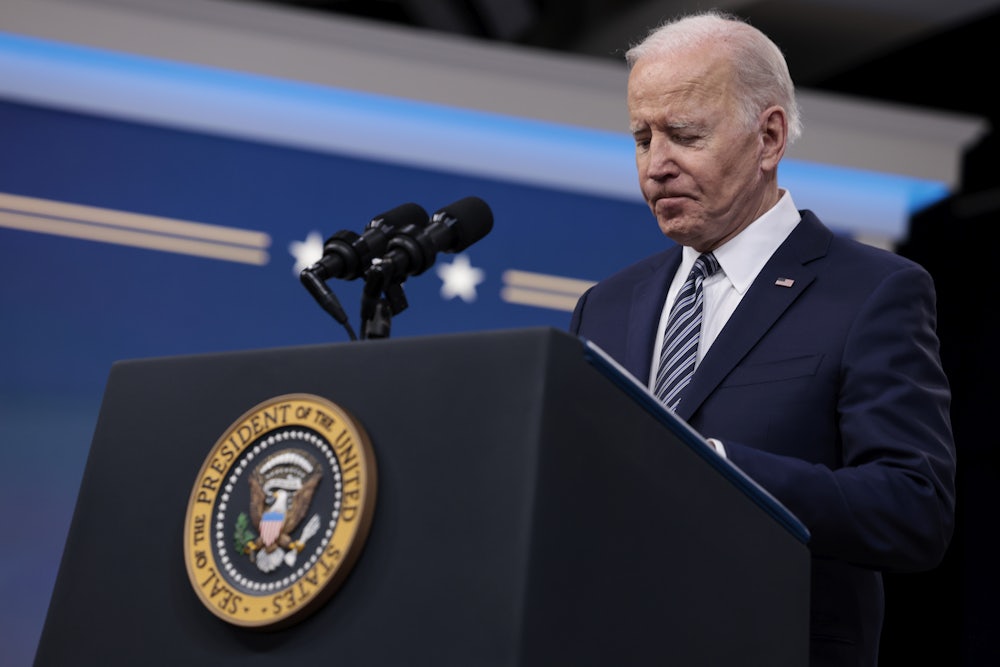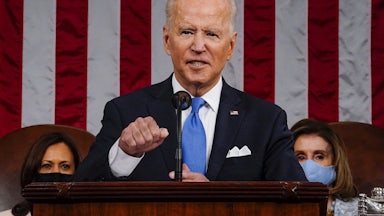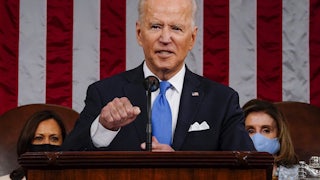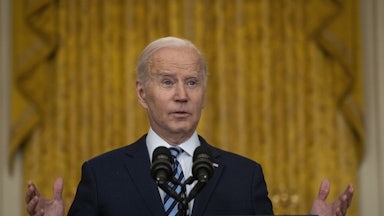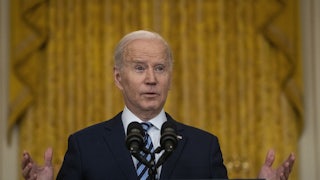Although Democrats control Congress, their inability to build the political will necessary to pass President Biden’s signature Build Back Better agenda demonstrates that powerful corporate entities and their congressional allies are in the driver’s seat.
As Congress idles without a viable affirmative agenda to support working families and small businesses, families pay higher prices for necessities, and the president’s poll numbers tank, the White House faces a choice. On the one hand, it could accept that the powerful corporations that bankrolled Build Back Better’s demise must sign off on any major policy initiative for it to be viable, killing Democrats’ ability to enact popular reforms, address critical national challenges, and build and retain political power up and down the ballot.
Or they can take direct aim at the powerful corporations and armies of lobbyists that are committed to preserving an unfair, even dangerous, status quo and fight to prove to them—and to the American people—who’s finally in charge.
Here’s how: If big corporations killed the Democrats’ signature effort to build up economic security for working families, the president should lead his party to rally around a working-class and small-business agenda that would tear down the ability of big corporations to exploit them instead.
This agenda should promise to deliver immediate relief to families and small businesses struggling to stay afloat as costs rise through levying excess profits taxes, ensuring big penalties for price-fixing, and resourcing enforcement agencies to prosecute price-gouging and other forms of corporate abuse. It should supercharge efforts to arrest America’s corporate power problem by banning large mergers, stock buybacks, and “payoffs for layoffs” to help build durable market power for working people and consumers and level the playing field for small businesses and entrepreneurs. And it should accelerate the economic and national security imperative of jump-starting production of a broad range of key goods here in America, rather than entrusting unfriendly authoritarian regimes to supply them in perpetuity.
Politically, embracing a sustained battle against corporate power might give Democrats a fighting chance come November. Taking on corporate power, as in the tech and pharmaceutical sectors, is one of the only political fights to generate enthusiasm across partisan lines and grow new political coalitions. Democrats should take note that Republicans are following Trump’s playbook to lean into an anti-corporate power message—just listen to Ted Cruz at this year’s Conservative Political Action Conference, where he railed against big businesses and echoed Louis Brandeis in framing decentralizing economic power as a core American value.
Corporate power is not only ultimately responsible for handing Democrats what is shaping up to be a humiliating legislative defeat. It is also at the root of three of today’s most consequential and politically salient challenges.
First, prices continue to rise sharply while dominant corporations celebrate record profits, leading large majorities of Americans rightly to view corporate power to be a key driver of inflation. While President Biden briefly acknowledged big corporations’ culpability in the State of the Union address and has critiqued both meatpackers and now oil companies for profiteering, the White House’s messaging on the causes of inflation—currently voters’ top concern—has been tepid at best.
Second, concentrated corporate power is now widely accepted, including by President Biden, to sit upstream from a broad range of long-festering economic challenges, from severely depressed earnings and dampened business dynamism to regional economic destruction and fragile supply chains. Earlier this month, just to name one example, the Treasury Department found that corporate power is reducing workers’ average earnings by up to a full quarter compared to a more competitive marketplace.
Third, the West’s response to Russia’s attack on Ukraine has demonstrated how concentrations of economic power translate into geopolitical power—and exposed the constraints that an unfriendly nation like China could impose on the United States by exerting influence over globally integrated markets or profit-over-country corporations. The administration’s national security team is rightly concerned over excessive dependence on the Chinese economy, although some economic policy officials are wary of limiting U.S. corporations’ access to Chinese markets.
How the Democrats ultimately respond to these problems will influence whether they stay in power and, if they manage to, whether they make choices now that will help rebuild a strong, resilient economy and democracy.
On the bright side, the Biden administration and influential Democrats in Congress have been warming up their muscles when it comes to tangling with dominant corporations. The president appointed trust-busting law enforcers and regulators, including antitrust enforcers Lina Khan and Jonathan Kanter, Consumer Financial Protection Bureau director Rohit Chopra, and Securities and Exchange Commission Chair Gary Gensler, who are pursuing aggressive agendas to rein in corporate and financial power from their respective perches. He also issued a wide-ranging executive order on reinvigorating competition that infuriated dominant corporations, from medical device manufacturers to social media platforms to modern-day railroad barons, and is delivering tangible benefits, like affordable hearing aids, to both consumers and small businesses. And just last week the White House touted a “billionaire tax” and constraints on stock buybacks as part of its 2023 budget.
Mainstream congressional Democrats have also shown what amounts to real progress in taking on concentrated corporate power. Democratic members from both the progressive and moderate wings of the party, such as Elizabeth Warren, Amy Klobuchar, Katie Porter, and Hakeem Jeffries, have come together to back important sector-specific bills that take aim at concentrated industries like e-commerce, energy, and global shipping.
But while all of this progress is laudable, it is occurring in a broader governing and messaging environment best characterized as incoherent in its posture toward corporate power overall. That means politically potent accomplishments, policy ideas, and rhetoric targeting corporate power are left on the table as November closes in. Major populist wins like the No Surprises Act, which banned medical surprise billing and was signed into law by the president in January, get virtually no victory lap; elite economists frighten the White House away from calling out corporations for blatant profiteering; everyday people fighting massive conglomerates, like striking Kellogg’s workers, receive not a visit from the president but an arm’s-length letter of polite support.
The upside of the White House’s incoherence, however, is that it is also open to learning and changing course. After taking a complex, health insurer–friendly approach to distributing rapid Covid-19 tests, for example, administration officials did an about-face to send tests free through the mail, an approach White House press secretary Jen Psaki had mocked just weeks earlier.
Here’s the big-picture lesson the White House should take away from the defeat of Build Back Better: For a president who centered his campaign on unity, it’s now time to lead the Democratic Party into battle against the powerful corporations committed to defeating his popular economic agenda.
Earlier generations of Democrats understood the centrality to both policy and politics of fighting corporate titans. The question now is whether the White House can learn quickly enough to forestall future catastrophe—electoral and otherwise—and summon the courage to lead the rest of the Democratic Party where this moment of crisis demands.
